Nutritional values
Servings: 4 ServingCalories:485kcalTotal Fat:32gSodium:890mgTotal Carbohydrate:52gDietary Fiber: 2gSugars: 3gProtein:28g

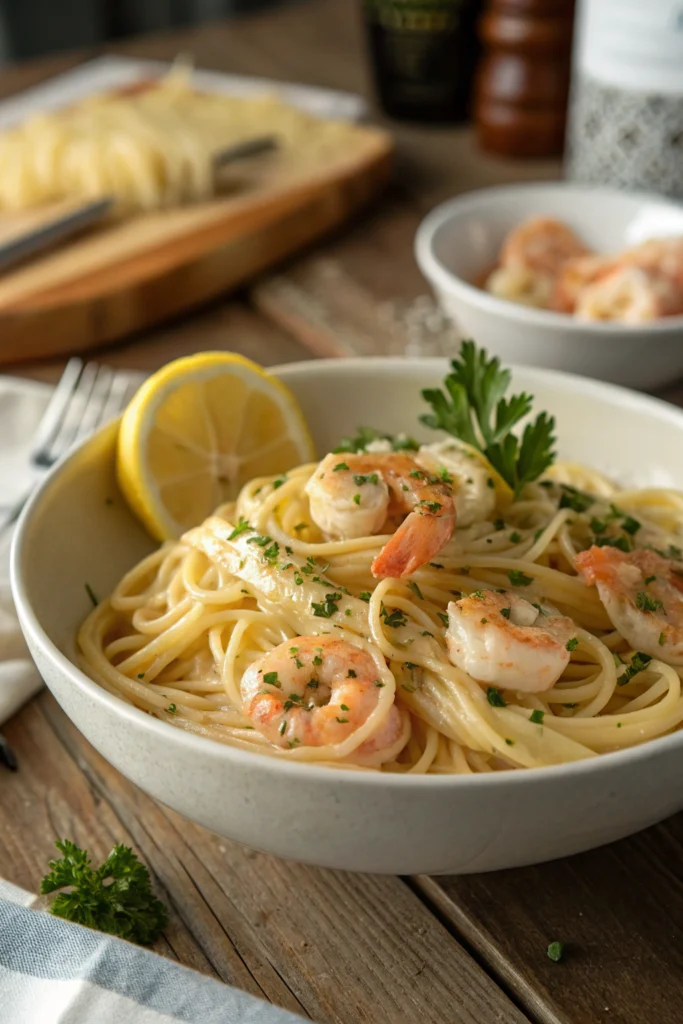
Get ready to whip up the most amazing shrimp pasta you've ever tasted! This crowd-pleasing Italian favorite combines perfectly cooked jumbo shrimp with al dente pasta in a rich, garlicky sauce that'll make your kitchen smell like a cozy trattoria. As someone who learned this recipe from my Italian grandmother, I can tell you – the secret lies in timing the shrimp just right.
You won't believe how quickly this restaurant-quality dish comes together. In just 30 minutes, you'll transform simple ingredients into a bowl of pure comfort that's fancy enough for date night but easy enough for weekday dinners. The tender shrimp, bathed in white wine and kissed with fresh herbs, creates pure magic when tossed with your favorite pasta shape.
This beloved shrimp pasta traces its roots to the sun-drenched coastal regions of Southern Italy. Back in the day, local fishermen's wives would whip up quick meals using the day's fresh catch. They'd toss plump shrimp with whatever pasta they had on hand, adding local olive oil and herbs from their gardens.
This practical approach to cooking still shines through in modern versions. The dish gained popularity in America during the 1960s when Italian-American restaurants started featuring it on their menus. Soon, home cooks discovered just how simple yet impressive this combination could be.
What makes this recipe truly special is its ability to showcase the natural sweetness of shrimp while keeping prep work minimal. From Sicily's bustling ports to your dinner table, this dish carries the heart of Mediterranean cooking traditions.
Shrimp pasta offers impressive health perks that make it more than just a tasty meal. The lean protein in shrimp helps build and repair muscles while keeping you feeling full longer. A typical serving packs about 20 grams of protein, plus essential omega-3 fatty acids that support heart and brain health.
When you combine this with whole grain pasta, you'll get a good dose of complex carbohydrates and fiber. The dish naturally provides selenium, which boosts immune function, and vitamin B12 for energy production. Adding fresh vegetables like cherry tomatoes or spinach increases the vitamin C and iron content. For those watching their calories, this dish is surprisingly light - a standard portion contains roughly 350-400 calories, depending on your sauce choice.
Plus, the natural minerals in shrimp, including zinc and iodine, help maintain healthy thyroid function and support overall wellness.
Shrimp pasta stands out as a quick-fix dinner hero for hectic weeknights. You'll love that shrimp cooks in just 3-4 minutes, while your pasta boils simultaneously. Got frozen shrimp? No problem! A quick 5-minute cold water bath gets them ready to cook. Most variations of this dish come together in under 20 minutes total.
Smart prep tricks include buying pre-peeled shrimp and keeping frozen portions ready. You can also chop garlic and herbs ahead during weekend prep. For lightning-fast results, keep your favorite pasta shapes and basic sauce ingredients as pantry staples. Many home cooks double the recipe, turning leftovers into quick lunch portions.
Plus, one-pot versions cut cleanup time in half - just toss everything in and let it simmer. When life gets crazy, this dish proves that you don't need hours in the kitchen for a restaurant-worthy meal.
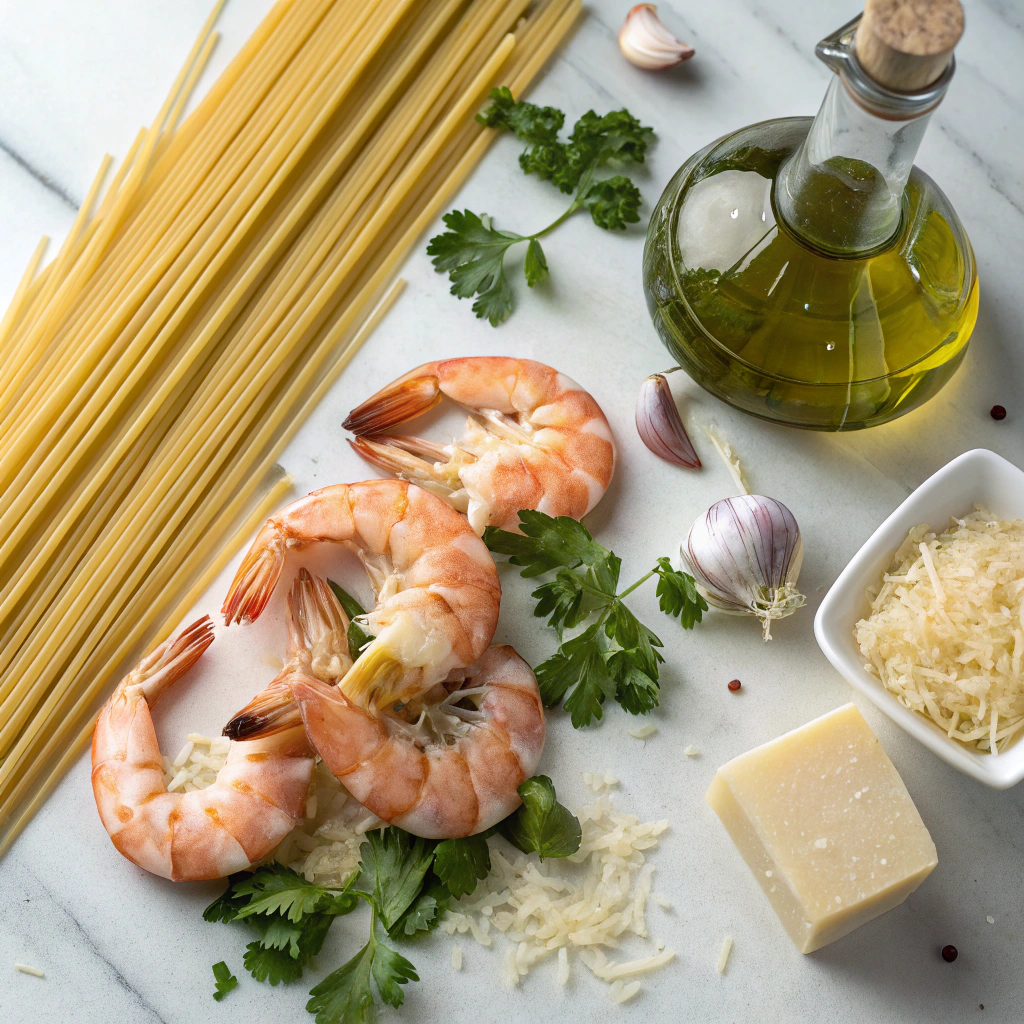
Before diving into your shrimp pasta adventure, gather everything you'll need for seamless cooking. Start with fresh jumbo shrimp - they're meatier and more flavorful than smaller varieties. Peel and devein them, leaving the tails on for that restaurant-style presentation.
For perfectly cooked pasta, choose a large pot that allows your noodles plenty of room to dance. Quality matters here - grab authentic Italian pasta like linguine or fettuccine for that silky texture. Fresh garlic, good olive oil, and real Parmigiano-Reggiano will elevate your sauce from good to outstanding.
Want to nail the timing? Keep your ingredients close to the stove and arranged in order of use. This mise en place approach ensures you won't scramble mid-cook, especially since shrimp cooks so quickly.
Creating that silky, restaurant-worthy sauce is all about timing and temperature control. Start by sautéing minced garlic in hot olive oil until fragrant - about 30 seconds is perfect. Add a splash of white wine and let it reduce by half, releasing those amazing aromas.
Now's the secret: drop your heat to medium-low before adding cream or butter. This prevents the sauce from breaking and keeps everything smooth. For a lighter version, reserve some starchy pasta water before draining - it's liquid gold for creating that perfect sauce consistency.
When combining sauce and pasta, use tongs to gently toss everything together, letting each strand get evenly coated. The sauce should coat the back of a spoon but still flow freely. Remember to taste and adjust seasonings right at the end - pasta water can dilute your flavors.
For the best shrimp pasta, size matters - aim for large (21/25) or jumbo (16/20) shrimp that'll stand up to the pasta. Fresh is fantastic, but quality frozen shrimp work great too. Just thaw them overnight in the fridge, never under running water which can make them mushy.
Pat those babies dry with paper towels before cooking - this is crucial for getting that gorgeous golden sear. Remove the shells but leave the tails on for presentation if you're feeling fancy. When deveining, make a shallow cut along the back and lift out that dark line.
For even cooking, butterfly larger shrimp by cutting a bit deeper - they'll curl into perfect C-shapes as they cook. Season just before cooking to prevent drawing out moisture, and remember: shrimp cook lightning-fast, about 2-3 minutes per side until they're just pink and opaque.
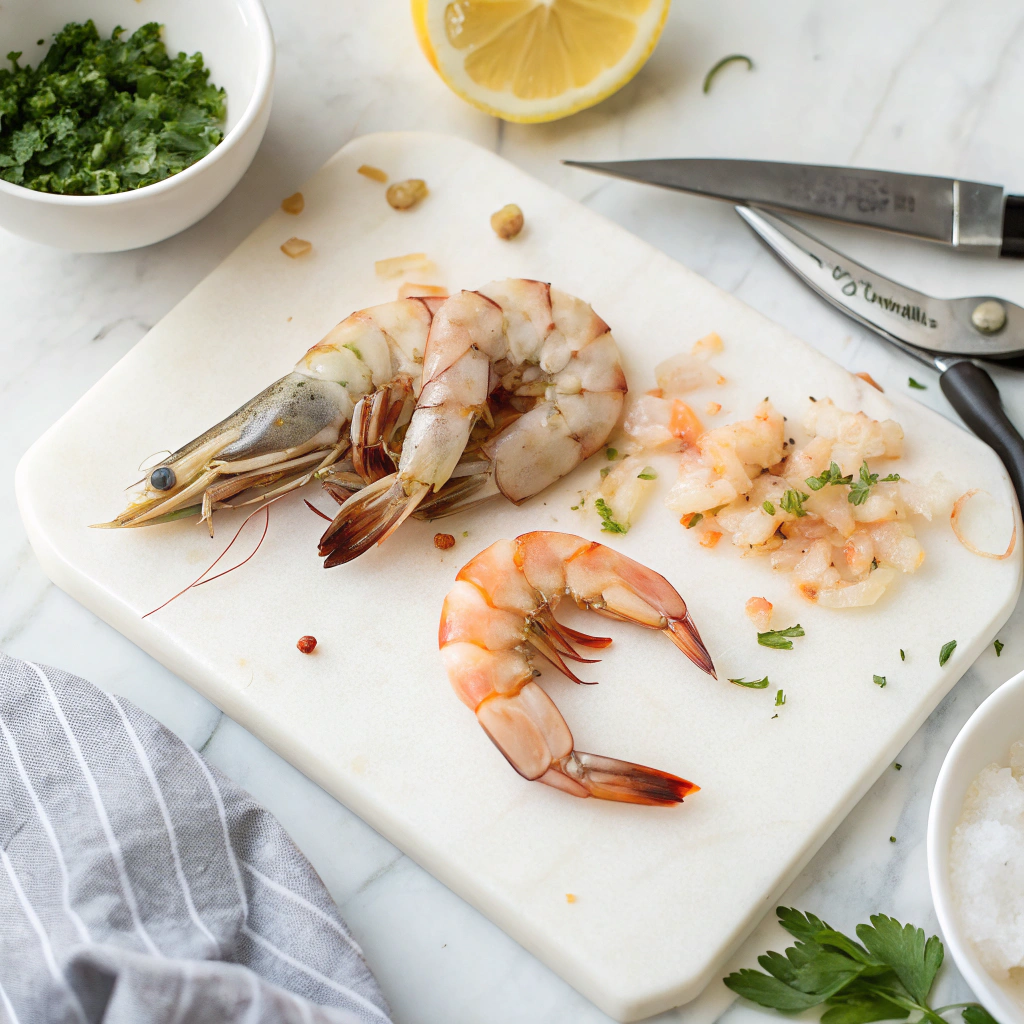
Let's dive into the first crucial step of creating restaurant-worthy shrimp pasta - choosing and preparing your shrimp like a pro. Start by selecting plump, translucent shrimp with a clean ocean scent and firm texture. The shells should be intact and free from black spots or yellowing.
For pasta dishes, medium to large shrimp (16-20 count) create the perfect bite-size pieces that won't get lost among the noodles. Once home, rinse them under cold water and check for any remaining shell pieces. Use kitchen shears to make a shallow cut along the back, then gently pull out the dark vein.
Give them one final rinse and pat completely dry with paper towels. Pro tip: keep the shells for making a quick seafood stock that'll add incredible depth to your pasta sauce. Store cleaned shrimp in an airtight container over ice in the fridge until ready to cook.
Every great shrimp pasta starts with choosing and cooking the right noodles. Long, thin pasta like linguine or angel hair works beautifully with shrimp, allowing the sauce to coat each strand evenly. Fill a large pot with plenty of water - you'll want about 4-5 quarts for every pound of pasta.
Once boiling, add a generous handful of salt until it tastes like sea water. This step is crucial for flavorful pasta. Drop your noodles and stir immediately to prevent sticking. Cook until just barely al dente, about 1-2 minutes less than package directions suggest, since they'll continue cooking in the sauce.
Save a cup of that starchy pasta water before draining - it's liquid gold for creating silky smooth sauces that cling perfectly to both pasta and shrimp. Test for doneness by biting through a strand - you should see a tiny white dot in the center.
Start your shrimp pasta journey with the star ingredient - plump, fresh shrimp. Look for firm, translucent shrimp with a mild ocean scent. Size matters here - medium shrimp (31-35 count) work best, cooking evenly while staying tender.
Peel and devein carefully, leaving the tails on for presentation if you'd like. Pat them dry thoroughly with paper towels before cooking - this helps achieve that perfect golden sear. Season simply with salt and pepper just before cooking to prevent drawing out moisture.
For extra flavor, try a quick 15-minute marinade in olive oil, garlic, and lemon zest. When cooking, watch for that telltale C-shape and pink color, but don't wait for them to curl into tight O's - that means they're overdone. Remember, shrimp cook incredibly fast, usually 2-3 minutes per side.
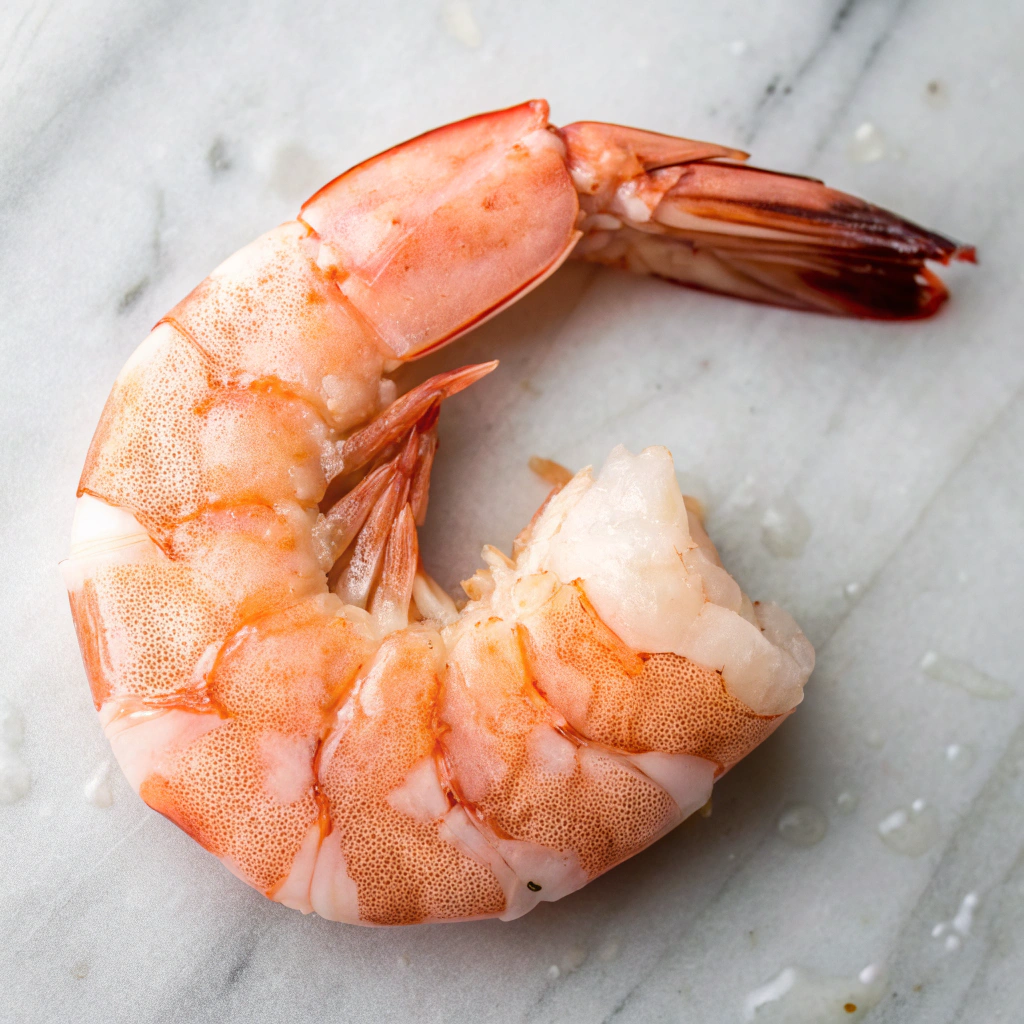
Transform your shrimp pasta from rubbery to restaurant-worthy with these game-changing tips. The secret lies in timing and technique. Watch for that perfect moment when shrimp turn pink with a gentle C-shape - they'll continue cooking slightly even after removal from heat.
Keep a close eye on the color change from grey to rosy pink, which typically happens in just 2-3 minutes per side. For foolproof results, try the baked shrimp scampi recipe method, which offers more control over cooking temperature. A quick ice bath after cooking can halt the process instantly, preserving that ideal tender texture.
Remember to remove shrimp from the pan before finishing your sauce, then return them at the very end. This prevents the dreaded rubber-band texture that comes from overcooking.
The right pasta choice can make or break your shrimp pasta dish. Long, thin noodles like linguine and angel hair excel at holding light, oil-based sauces, while tube shapes like penne trap chunky tomato-based sauces beautifully. For creamy sauces, fettuccine's flat surface creates the ideal canvas.
When cooking, remember that fresh pasta needs just 2-3 minutes, while dried varieties typically take 8-10 minutes for that perfect al dente bite. Keep a close eye on the pasta's texture - it should have a slight resistance when bitten. Always reserve a cup of starchy pasta water before draining; this liquid gold helps bind your sauce and creates that restaurant-quality silkiness.
Pro tip: Match delicate shrimp with similarly delicate pasta shapes to maintain balance in every bite. Your pasta should complement, not overwhelm, those succulent shrimp morsels.
When making shrimp pasta, choosing the right shrimp makes all the difference. Look for firm, translucent shrimp with a mild ocean scent - avoid any with strong fishy odors or slimy texture. Size-wise, medium shrimp (31-35 per pound) work beautifully in pasta dishes, offering the perfect bite-to-noodle ratio.
Fresh shrimp should have shells that are tightly attached and feel springy when gently pressed. While fresh is fantastic, don't shy away from quality frozen shrimp - they're often frozen right on the boat, preserving peak freshness. Just thaw them overnight in the fridge or under cold running water if you're in a hurry.
Pat them completely dry before cooking to ensure proper searing. For shell-on versus peeled, I prefer peeled and deveined for pasta dishes - it makes eating more enjoyable and saves your dinner guests from getting their hands messy at the table.

Transform your shrimp pasta into a coastal Mediterranean feast with bright, bold flavors. Start by sautéing succulent shrimp in extra virgin olive oil until they turn perfectly pink and curl into delicate crescents. The magic happens when you deglaze the pan with a splash of crisp white wine, letting those gorgeous brown bits dissolve into a silky sauce.
Add halved cherry tomatoes, briny kalamata olives, and fresh spinach leaves that wilt just slightly in the warm pan. A generous sprinkle of crumbled feta cheese adds creamy tanginess, while torn fresh basil leaves bring aromatic brightness. Finish with a drizzle of your best olive oil and a squeeze of lemon to make those flavors sing.
Transform your shrimp pasta into a zesty Southern sensation with bold Cajun flair. Start by tossing plump shrimp in a spicy blend of paprika, cayenne, oregano, and thyme until they're fully coated. Sear them quickly in a hot skillet until they turn pink and develop a gorgeous crust.
The magic happens when you add diced bell peppers, celery, and onions - the holy trinity of Cajun cooking - letting them sweat until tender. A splash of heavy cream creates a silky sauce that clings perfectly to your pasta choice, while sliced andouille sausage adds an extra layer of authentic Louisiana heat.
Fresh parsley and green onions brighten up the dish, while a squeeze of lemon cuts through the richness. Remember to adjust the spice level to your taste - you can always add more heat, but you can't take it away!
Transform your shrimp pasta into a sun-kissed Mediterranean delight with bright, fresh flavors. Start by marinating jumbo shrimp in a mixture of olive oil, fresh lemon juice, and minced garlic. While that's working its magic, sauté cherry tomatoes until they burst, releasing their sweet juices into the pan.
Add a splash of white wine and let it reduce to concentrate those gorgeous flavors. The pasta gets tossed with the sauce and topped with the perfectly cooked shrimp, then finished with a handful of fresh basil leaves, briny capers, and crumbled feta cheese.
A drizzle of your best olive oil and a sprinkle of red pepper flakes adds the final touch. This light yet satisfying dish captures the essence of coastal Mediterranean cooking - simple ingredients treated with respect to create something truly special.
Ready to dive into a world of coastal flavors? Your kitchen already has most of what you need for an incredible shrimp pasta dinner. Don't worry about being perfect - cooking should be fun! Start with fresh ingredients, trust your instincts, and remember that practice makes perfect. Share your creation with #TalesRecipes, and let's cook together!
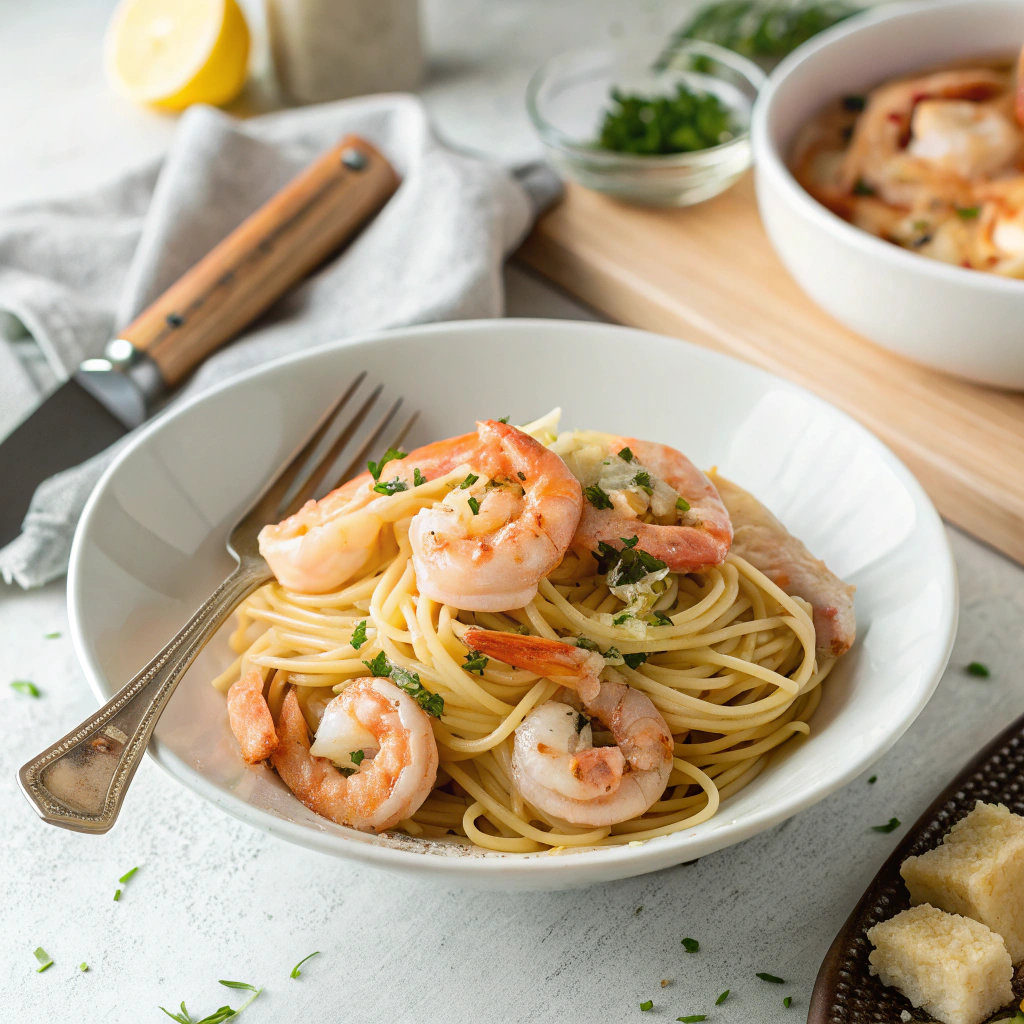
Tender jumbo shrimp and al dente pasta come together in a rich, garlicky white wine sauce. This Italian-inspired dish combines fresh seafood with perfectly cooked pasta for a luxurious yet simple dinner that tastes like it came from a high-end restaurant.
Servings: 4 ServingCalories:485kcalTotal Fat:32gSodium:890mgTotal Carbohydrate:52gDietary Fiber: 2gSugars: 3gProtein:28g
Storage:
Store in airtight container in refrigerator up to 2 days
(Keep shrimp separate from pasta if possible)
Reheating:
Warm pasta in skillet over medium heat
Add splash of cream or pasta water to revive sauce
(Heat until internal temperature reaches 165°F)
Freezing:
Not recommended for cream-based sauce
Variations:
Spicy Cajun: Add 2 tablespoons Cajun seasoning
Mediterranean: Use cherry tomatoes, olives, and feta instead of cream sauce
Lemon-Herb: Replace cream with butter-lemon sauce and fresh herbs
Common Issues:
Watery Sauce: Simmer longer to reduce, add more cheese
Rubbery Shrimp: Don't overcook, remove from heat when just pink
Clumpy Pasta: Toss immediately with sauce, add pasta water as needed